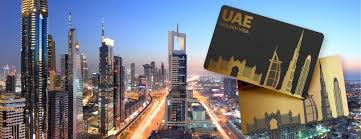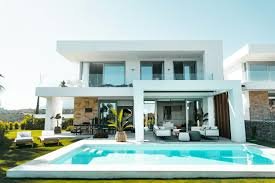Now Reading: Golden Visa Program: How It’s Shaping the UAE Real Estate Landscape in 2025
-
01
Golden Visa Program: How It’s Shaping the UAE Real Estate Landscape in 2025
Golden Visa Program: How It’s Shaping the UAE Real Estate Landscape in 2025

Table of Contents
The UAE Golden Visa Program, launched in 2019, has significantly influenced the UAE real estate landscape by attracting foreign investors, entrepreneurs, and professionals through long-term residency options. In 2025, the program continues to drive demand, reshape market dynamics, and contribute to economic diversification. Below is an analysis of how the Golden Visa is shaping the UAE real estate market in 2025, based on eligibility, investment trends, and broader impacts.
Key Features of the Golden Visa Program

The Golden Visa offers 5- or 10-year renewable residency to eligible individuals without requiring a local sponsor. For real estate investors, the primary pathway involves:
- Investment Threshold: Purchasing property worth at least AED 2 million (approximately USD 545,000) in designated Freehold Areas qualifies investors for a 10-year visa. Alternatively, a AED 750,000 (USD 204,000) investment secures a 2-year visa.
- Mortgage Flexibility: Investors can use mortgages from UAE banks, with a minimum 50% down payment for off-plan properties or 20% for ready properties, making investment more accessible.
- Family Sponsorship: Visa holders can sponsor spouses, children, and sometimes parents, enhancing appeal for family-oriented investors.
- No Residency Requirements: Holders face no minimum stay requirements, offering flexibility for global investors.
Impact on the UAE Real Estate Landscape in 2025
- Surge in Demand for High-Value Properties:
- The AED 2 million threshold has driven demand for properties in prime areas like Dubai Marina, Downtown Dubai, and Palm Jumeirah, where luxury apartments and villas meet the investment criteria.
- Posts on X indicate a growing interest in properties explicitly marketed as Golden Visa-eligible, with 110 new listings added in May 2025.
- The Knight Frank Prime Global Cities Index Q3 2024 reported a 16.9% annual increase in Dubai’s prime residential property prices, partly attributed to Golden Visa-driven demand.
- Expansion of Off-Plan Property Market:
- 2025 updates allow off-plan properties to qualify for the Golden Visa, provided at least 50% of the payment is completed. This has boosted the off-plan market, as developers offer flexible payment plans, making investment more attainable.
- This flexibility has spurred development in mid-tier and luxury segments, with developers like DAMAC Properties promoting Golden Visa-eligible projects.
- Economic Diversification and Investment Growth:
- The Golden Visa aligns with the UAE’s D33 Economic Agenda, aiming to position Dubai as a global hub by 2030. Real estate investment through the program supports economic diversification by attracting high-net-worth individuals (HNWIs). Henley & Partners projected the UAE would welcome 6,700 new millionaires in 2024, with similar trends expected in 2025.
- The program has driven growth in both luxury and mid-tier property markets, increasing demand for housing, commercial spaces, and infrastructure.
- Attracting Global Talent and Wealth:
- The Golden Visa’s inclusivity—covering investors, entrepreneurs, and professionals like educators and gaming experts—has broadened its appeal. New 2025 categories, such as digital influencers and sustainability experts, further diversify the investor pool.
- This influx of talent fuels real estate demand, as professionals seek residential and commercial properties, boosting rental markets and property values.
- Tax and Financial Incentives:
- The UAE’s tax-free environment (no personal income tax, capital gains tax, or VAT in Freehold Areas for up to 20 years) enhances the program’s attractiveness. Investors benefit from high returns on investment (ROI) and rental income.
- The ESAAD program offers Golden Visa holders discounts of 30–70% on various services, including real estate, further incentivizing investment.
Application Process and Market Accessibility
- Streamlined Process: Investors apply through the Federal Authority for Identity and Citizenship (ICA) or Dubai’s General Directorate of Residency and Foreigners Affairs (GDRFA). Required documents include a passport, proof of property ownership (e.g., title deed), and a clean criminal record. Processing takes 2–4 weeks, with fees around AED 4,000.
- Remote Investment: Investors can purchase properties without visiting the UAE, facilitated by real estate professionals and legal advisors, making the market accessible globally.
- Mortgage Options for Non-Residents: X posts highlight that non-residents can secure UAE mortgages based on home-country income, broadening access to Golden Visa-eligible properties.
Challenges and Considerations
- High Investment Threshold: The AED 2 million requirement (approximately INR 4.67 crore) remains a barrier for some investors, though mortgage options mitigate this.
- FEMA Compliance: Indian investors, for instance, must navigate India’s Foreign Exchange Management Act (FEMA) regulations, particularly for off-plan properties or loans.
- Market Saturation Risks: Rapid investment could lead to oversupply in certain segments, though Dubai’s diversified economy and global appeal mitigate this risk.
Broader Implications
- Economic Impact: The Golden Visa has increased real estate’s contribution to the UAE’s GDP by driving demand for housing and commercial spaces. It also creates jobs in construction, real estate, and related sectors.
- Global Competitiveness: The UAE competes with countries like Portugal and Greece, but its tax-free environment, strategic location, and relaxed residency rules give it an edge.
- Social and Cultural Benefits: The program fosters a diverse expat community (88% of UAE’s population), enhancing cultural vibrancy and supporting international schools and healthcare facilities.
Conclusion
In 2025, the UAE Golden Visa Program continues to transform the real estate landscape by driving demand for high-value and off-plan properties, attracting global wealth, and supporting economic diversification. Its flexible investment options, tax benefits, and lack of residency requirements make it a magnet for investors, while new categories like educators and gaming professionals broaden its impact. Despite challenges like high investment thresholds, the program’s streamlined processes and financial incentives ensure sustained growth in the UAE’s real estate market, positioning it as a global investment hub. For further details, investors can explore official UAE government portals or consult agencies like Get Golden Visa or Henley & Partners.
WATCH MORE:
READ MORE: Dubai Real Estate Market Q1 2025 Report: Sales Performance and Future Outlook for U.S. Investors





















